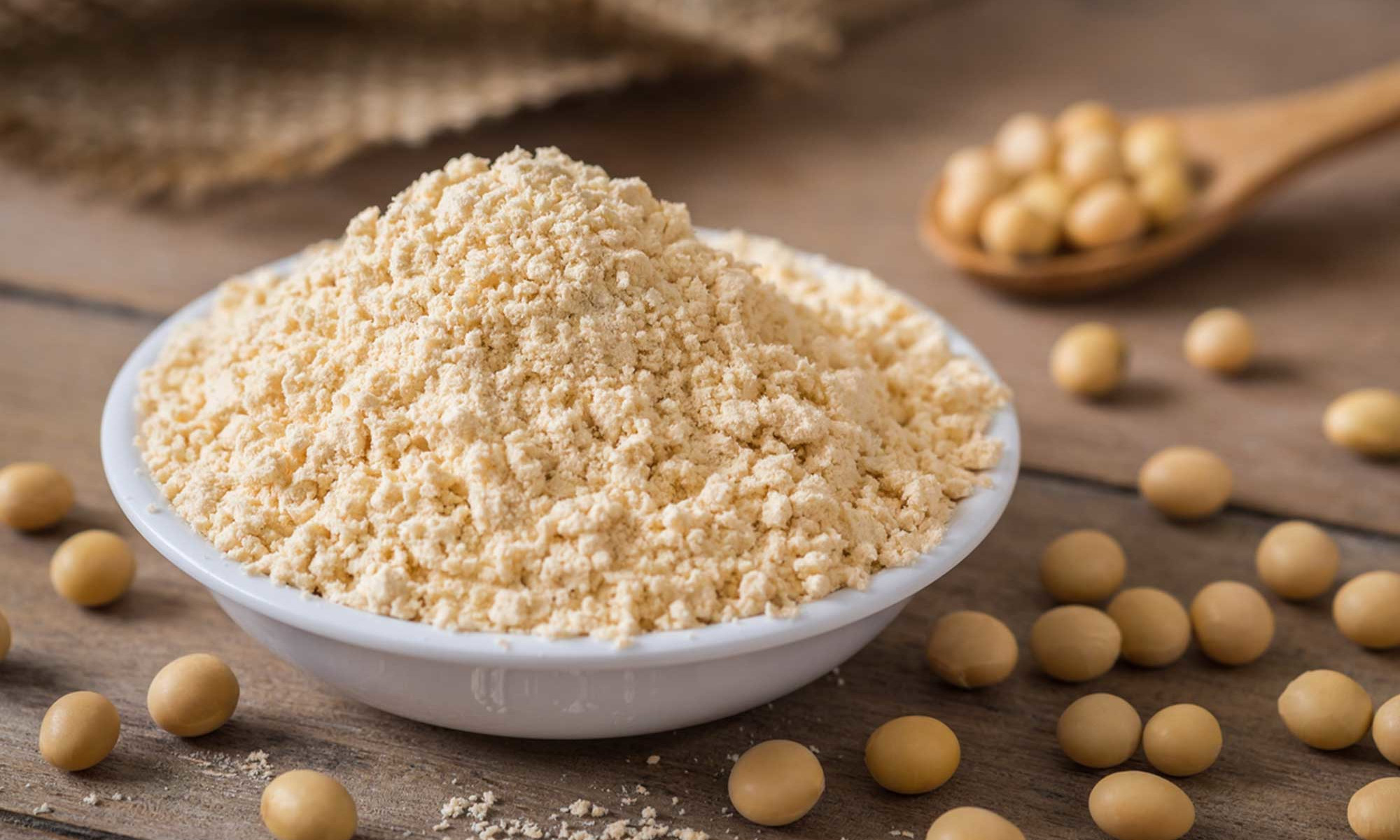This Plant-Based Protein Source Gets A Lot Of Flak — Is It Deserved?
No, soy doesn't mess up your hormones.


Certified holistic nutritionist
Certified holistic nutritionist
Adam Meyer is a health writer, certified holistic nutritionist, and plant-based athlete

Expert review by
Lauren Torrisi-Gorra, M.S., RD
Registered Dietitian
Lauren Torrisi-Gorra, MS, RD is a registered dietitian, chef, and writer with a love of science and passion for helping people create life-long healthy habits. She has a bachelor’s degree in Communication and Media Studies from Fordham University, a Grand Diplôme in Culinary Arts from the French Culinary Institute, and master's degree in Clinical Nutrition and Dietetics from New York University.
Image by Amarita / Istock June 12, 2023 Our editors have independently chosen the products listed on this page. If you purchase something mentioned in this article, we may Next time you are grocery shopping, take a look at the ingredients list of any prepackaged product and you're likely to find soy protein isolate near the top. But what exactly is soy protein isolate? And even more—what's the difference between soy protein and isolate? Here, nutrition experts weigh in on the pros and cons of soy protein isolate, its potential side effects, and how it stacks up against other protein sources.
Advertisement
This ad is displayed using third party content and we do not control its accessibility features.
What is soy protein isolate?
Soy protein isolate is a highly refined plant protein derived from soybeans. It's at least 90% protein by weight1 and nearly carbohydrate and fat-free.
Like other types of protein isolate, soy protein isolate is produced by separating the fiber2, carbohydrates, fats, and other nutrients from concentrated soy protein. While this creates a highly concentrated form of protein, it's much more processed than soy products like tofu, tempeh, and edamame.
"Soy protein isolate contains all nine essential amino acids and it's low in fat and carbohydrates," explains Kien Vuu, M.D., a human longevity and performance expert and assistant clinical professor of medicine at UCLA.
"Soy protein isolate can be found in protein powders, shakes, and bars. In addition, it could also be used in emulsifiers and thickeners, as well as meat alternatives," Vuu adds.
Summary
Soy protein isolate is a highly processed plant protein derived from soybeans via chemical engineering. It is frequently found in protein powders, bars, and shakes. Low in carbohydrates and fat, soy protein isolate contains all essential amino acids.
Advertisement
This ad is displayed using third party content and we do not control its accessibility features.
Benefits of soy protein isolate:
1.
It's a high-quality source of plant protein.
Soy protein isolate is a high-quality plant protein comparable to animal protein, per a recent study3.
That's because soy protein has a well-balanced amino acid profile and a high Protein Digestibility-Corrected Amino Acid Score (PDCAAS) score, a measurement of protein quality4 based on the ratio of its digestibility and your body's amino acid requirements.
"Soy protein isolate has a PDCAAS score of one, which is considered a high-quality protein source, similar to animal proteins," explains Vuu. This makes it a good choice for supporting muscle growth and maintenance.
Advertisement
This ad is displayed using third party content and we do not control its accessibility features.
Soy protein isolate is easy on your digestive system because it's stripped of most of the indigestible carbohydrates and fibers found in whole soybeans5. This makes sense considering its high PDCAAS score.
Vuu adds, "By removing most indigestible fibers and carbohydrates from the entire soybean, it makes the product more digestible and less likely to cause gastrointestinal problems. This could be particularly useful for people with pancreatic insufficiency or people who have problems digesting complex protein sources."
3.
It may support heart health.
Several studies6 have indicated that consuming soy protein can boost heart health by helping lower LDL ("bad") cholesterol and triglycerides (blood lipids)—two significant risk factors for cardiovascular disease7.
"Soy protein and soy foods are generally good for the heart and blood vessels because they provide polyunsaturated fat, fiber, vitamins, and minerals, and are low in saturated fat," says Kimberly Gomer, M.S., R.D., LDN, a registered dietitian and nutritionist at Body Beautiful Miami. She points to research that found that swapping red meat8 for plant proteins including soy was associated with a 14% lower risk of heart disease.
Advertisement
This ad is displayed using third party content and we do not control its accessibility features.
4.
It may help prevent bone and muscle loss.
As you age, it becomes increasingly important to maintain bone health. That's because your bones begin to break down more than they replenish as you get older.
Over time, bone loss can lead to osteoporosis and brittle bones. However, getting adequate protein intake by consuming soy protein isolate can help prevent bone loss and increase bone mineral absorption, according to a 2020 meta-analysis9.
Specifically, the research suggests that soy isoflavones can prevent osteoporosis-related bone loss and increase bone mineral density in normal-weight people. Also, they can diminish bone resorption in overweight and obese individuals.
As a high-quality protein source, soy isolate can also help combat age-related muscle loss when paired with resistance training.
Downsides of soy protein isolate:
1.
Soybeans are associated with high GM and pesticide use.
Over 90% of soybean crops are genetically modified to be herbicide-tolerant, which can lead to increased pesticide use.
Specifically, residues of the toxic chemical glyphosate have been found on soybean crops, according to one study10. Additionally, increased pesticide use on soybean crops can cause environmental issues.
Advertisement
This ad is displayed using third party content and we do not control its accessibility features.
2.
Soy contains phytoestrogens that may aggravate existing hormonal issues.
"Soy and soy-related products contain phytoestrogens, which can mimic the hormone estrogen in the human body," explains Vuu. "Many people still debate the effects of phytoestrogens on human health. However, some studies have demonstrated adverse effects on hormonal and reproductive health in sensitive individuals."
However, it's important to note that soy's phytoestrogens don't cause hormonal issues. While some research suggests they can cause problems for those with existing hormonal imbalances, other studies11 have found that soy and isoflavone intake has no impact on reproductive health.
In addition, some research12 suggests potential health benefits of soy, such as reducing cancer risk, alleviating menopausal symptoms, and improving memory.
3.
Soy monocultures can negatively affect the environment.
Large-scale monoculture farming, where only one type of crop is grown at a time in a single field, can have negative environmental consequences. For example, a 2013 study13 concluded that soybean monoculture farming can lead to soil degradation and decreased biodiversity.
"Other downsides for soy protein isolate may include the large scale of soybean farming, which is often times a form of monoculture. These practices lead to soil degradation, increase susceptibility to pests and disease, and can cause a loss of biodiversity. In addition, soybean farming has also led to deforestation in some areas," warns Vuu.
4.
Soy isolate is highly processed and refined.
"Soy protein isolate is a protein that's been isolated from soybeans via chemical engineering," says Gomer. "The soybeans are washed with an acid and then neutralized in an alkaline solution." This high level of processing can affect soy isolate's protein quality14 as well as strip the crop of other healthy nutrients.
5.
Soy protein is lower in certain essential amino acids.
As leading amino acid researcher Don Layman, Ph.D., explained on the mindbodygreen podcast, most plant proteins, including soy isolate, are also inherently lower than animal proteins in certain key amino acids like leucine. This means that you have to consume more of them in order to meet your protein targets, increasing your overall calorie intake. While not necessarily a bad thing, this can be a concern for those who are consuming protein to help them lose weight.
Other soy products
For those hoping to take a more whole-foods approach to meeting daily protein needs, here are several less-processed soy products that can be included in a healthy diet:
Is soy protein isolate better than whey?
Both soy protein isolate and whey protein are complete protein sources with benefits and drawbacks. Soy protein isolate is plant-based, making it a suitable choice for vegans, vegetarians, and those seeking to reduce their animal consumption. It's also free from lactose and cholesterol and is low in fat. Whey protein is an easy-to-digest high-quality protein that's more rapidly absorbed than soy protein.
Ultimately, the choice between soy protein isolate and whey protein depends on your dietary needs, allergies, sensitivities, and taste preferences. Both types of protein can be part of a healthy, balanced diet, states Vuu.
Risks and side effects
What about soy protein isolate side effects? While soy protein isolate is generally safe for most people when consumed in moderation, there are some potential dangers:
1.
People with allergies should avoid taking it.
Soybeans are among the eight major food allergens, according to the Food and Drug Administration15. As a result, some people may experience common soy allergic reactions16, such as skin rashes, hives, abdominal pain, vomiting, and diarrhea—even with a soy protein isolate powder.
2.
It may cause GI distress.
Some may experience gastrointestinal (GI) distress like bloating or gas after taking soy protein isolate. "Many people have allergies to soy products, and it might be a cause for G.I. distress in some people," explains Vuu.
2.
It may be harmful for those with kidney and liver issues.
Consuming large amounts of any type of protein is taxing on the liver and kidneys, and it may be damaging for those with existing liver or kidney disease. However, taking soy protein isolate in moderation as part of a healthy, balanced diet is unlikely to cause any issues.
FAQ
Is there a difference between soy protein and soy isolate?
The terms "soy protein" and "soy protein isolate" refer to different forms of soy-derived protein with varying levels of processing and protein content. Soy protein is an all-encompassing term that includes any protein extracted from soybeans, including soy protein concentrate, texture soy protein, and soybean products like tofu, tempeh, edamame, soy curls, and miso.
Soy protein isolate is a more processed form of soy protein made by separating the protein from other nutrients, including fiber, carbohydrates, and fats. This form typically contains at least 90% protein by weight.
"Soy protein is a word that could describe anything from soy milk to tofu to miso and beyond," says Gomer. "It's used broadly to describe food made from soybeans. On the other hand, soy protein isolate is the isolated protein from the soybean that's engineered to create a more highly concentrated form of protein."
Does soy protein isolate increase estrogen?
Soy protein isolate contains compounds called phytoestrogens, specifically isoflavones, which can mimic the hormone estrogen in your body. However, the impact of soy protein isolate on estrogen levels and hormone balance is inconclusive.
"However, for most individuals, moderate consumption of soy protein isolate as part of a balanced diet is unlikely to cause significant hormonal imbalances," says Vuu.
The takeaway
Soy protein isolate is a high-quality, easily digestible plant protein source suitable for any dietary pattern. While soy protein isolate is often portrayed as unhealthy due to its phytoestrogen content, scientific research indicates that these pose risks only for those with existing hormonal issues.
However, we recommend choosing whole food sources of soy protein or soy protein concentrate over soy protein isolate powders when possible since they're less processed and more nutritious. Other vegan protein powders, like pea protein powder, can also help plant-based eaters meet their daily protein needs.

 Hollif
Hollif 





























![Is Your SEO Strategy Built for the AI Era? [Webinar] via @sejournal, @hethr_campbell](https://www.searchenginejournal.com/wp-content/uploads/2025/07/6b-240.png)


